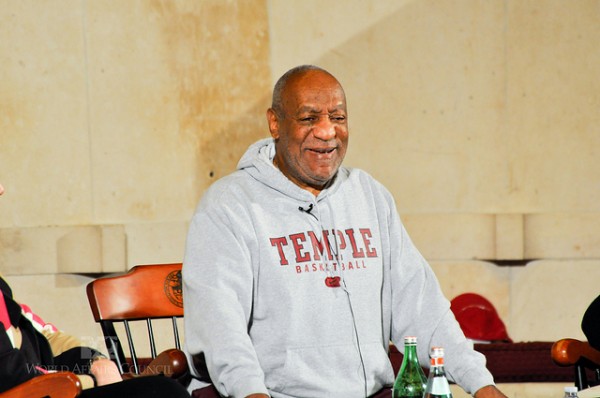Updated: Oct. 15, 2015 at 4:44 p.m.
GW administrators are in conversations about revoking an honorary degree awarded to Bill Cosby in 1997.
As details about Cosby drugging and sexually assaulting dozens of women have come to light over the past several years, and have picked up steam in the last several months, colleges across the country have had to weigh the symbolism of an honorary degree with the impact of a Cosby connection. Nearly 60 institutions, including GW, have not cut ties – but seven universities have decided to take back Cosby’s honorary degree because of the allegations.
“The issue is being discussed,” Candace Smith, a University spokeswoman, said.
Universities will often award well-known politicians, actors or humanitarians an honorary degree as a way to show admiration or appreciation. For example, Apple CEO Tim Cook was awarded an honorary doctorate of public service for speaking at Commencement last spring.
Cosby, 78, is a well-known comedian and starred in “The Cosby Show” from 1984 to 1992. Allegations of the assaults have been sprinkled throughout media coverage over the last several years, though many of the most high-profile incidents occurred as many as several decades ago, according to New York Magazine.
During questioning 10 years ago, Cosby admitted to using his fame to seduce women and drugging them with Quaaludes before having sex with them, according to a deposition The New York Times released this summer. Cosby will appear in court again this Friday, and gave a seven-hour deposition for a lawsuit last week.
The survivors of Cosby’s alleged attacks have been widely covered in the media, including a segment on 60 Minutes and a feature in New York Magazine released this summer. Cosby is not yet facing criminal action, but several lawsuits have been filed against him. Gloria Allred, the lawyer representing more than three dozen women who have alleged Cosby assaulted them, declined to comment for this story.
Former University President Stephen Joel Trachtenberg, who was president when Cosby spoke at Commencement in 1997, said while Cosby’s actions are detestable, taking back the degree does not necessarily solve the problem.
“It does not actually get to right. It provides no real comfort to the abused,” Trachtenberg said in a statement sent to The Hatchet. “Mr. Cosby knows that we no longer esteem him.”
He added that it is too easy to formally remove Cosby’s degree to “underscore our own virtue,” because members of the University have already lost their respect for the actor.
“We must as individuals and as a community look after each other and keep each other safe. We can’t do much about the past but we can do a great deal to craft the future and heal the world,” Trachtenberg said.
Laura Zillman, vice president of Students Against Sexual Assault, said she did not know of any students at GW who were lobbying the University to remove Cosby’s degree.
In 2012, students criticized GW for awarding an honorary degree to Mexican billionaire Carlos Slim. The late Libyan dictator Muammar el-Qaddafi wanted an honorary degree from GW in exchange for a large gift, but Trachtenberg eventually declined, the Chronicle of Higher Education reported this fall.
After past court depositions became public in July, institutions who had awarded Cosby honorary degrees or named professorships or programs after him removed the honors in reaction to the news.
Universities’ leaders cited violation of campus policies and expectations as reasons to rescind Cosby’s degree.
“By his own admission, Mr. Cosby engaged in behaviors that go entirely against our university’s mission and the guiding values we have worked so hard to instill on our campus,” Michael R. Lovell, the president of Marquette University, said in a statement last month. The university was the first to retract Cosby’s honorary degree.
In quick succession, Fordham and Brown universities chose to remove Cosby’s honorary degrees, citing similar reasons.
Just this week, four more universities rescinded his degrees, inluding Lehigh University, which announced the decision yesterday.
Brown University President Christina Paxson said that as college campuses emphasize ending sexual assault, taking back the honorary degrees is an important signal of a university’s attitudes toward sexual assault. Brown University took back Cosby’s honorary degree at the end of September.
“It is particularly troubling as our university community continues to confront the very real challenges of sexual violence on our campus and in society at large,” Paxson said in a statement.
Ellie Smith contributed reporting.







